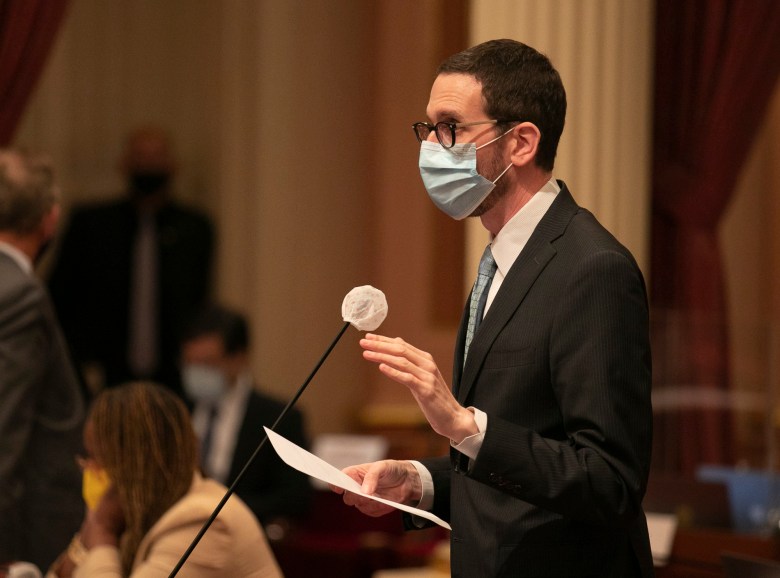With recall looming, Newsom gets some help from friends in Legislature
In summary:
Democratic leaders in the Legislature shield Gov. Gavin Newsom from having to decide some controversial bills during the recall campaign.
Turns out 2021 is not a good year for Democrats to make California stand out too much for being weird.
With Gov. Gavin Newsom facing a Sept. 14 recall election, fellow Democrats in the Legislature appeared to protect him from having to sign or veto some controversial measures as they culled hundreds of bills Thursday in the biannual ritual known as the suspense file.
The notorious process marks a critical point in the legislative cycle when lawmakers decide which bills will advance to a vote of the full Senate or Assembly — and which they will snuff out for the year, often with no explanation. Killing bills on the suspense file is one way for Democrats who control the Capitol to shield their party from having to make a tough vote — on a proposal that could anger a powerful interest group, frustrate progressive constituents or draw the wrong kind of attention to this deep-blue state.
The recall election that’s under way — voters have already received ballots in the mail and have until Sept. 14 to turn them in — added a new layer of political intrigue to the suspense file process that’s already steeped in mystery. While Newsom has until Oct. 10 to decide on bills the Legislature approves, killing these bills — which had already passed one chamber — removes them from the campaign entirely.
Here are highlights of what we saw:
It’s not the time to push boundaries
Newsom will not have to decide this year whether California should legalize mushrooms, ecstasy and other psychedelic drugs — nor will he have to weigh in on an ethical debate over turning people into garden compost after they die.
Minutes before the suspense file hearing began, the senator who wrote a bill allowing adults to use and share psychedelic drugs announced that he’s shelving it for the year. While the proposal drew support from progressives who want to decriminalize drug use and advocates who cite the therapeutic role of psychedelics in treating some mental health disorders, it was opposed by law enforcement groups as well as Republicans and moderate Democrats.
“We have a realistic chance of passing it next year,” said a statement from Sen. Scott Wiener, a San Francisco Democrat.

Lawmakers also halted a measure to allow Californians to turn their bodies into compost after death. Though it had bipartisan support and was pitched as an environmental alternative to cremation, which emits pollution, the proposal faced opposition from the Catholic Church.
Bottling the bills up now protects Newsom from having to choose between his progressive base and the potential national perception of: “There goes crazy California.”
No new campaign finance rules
Democrats also sidelined two progressive efforts to tackle the influence of money in politics. One measure would have required more disclosure on online political ads about who’s funding them, and would have required disclosing the funders behind initiative petitions when voters sign them. The other would have required prosecutors to recuse themselves from investigating a police shooting if they’d received campaign donations from police unions.
Both measures were opposed by public employee labor unions, which are major campaign donors to Democrats. The Service Employees International Union, which testified against the disclosure bill, has poured at least $4 million into Newsom’s anti-recall campaign.
Police unions — which have not donated to Newsom’s anti-recall campaign but donate heavily to legislators’ reelection campaigns — opposed the bill requiring prosecutors to recuse themselves from criminal investigations of officers if they take police unions’ campaign donations. The measure also reflected an ideological schism among district attorneys. Though it was backed by a handful of progressive prosecutors, it was opposed by the statewide association.
Lawmakers helped themselves by avoiding a conflict with police unions — while also helping Newsom steer clear of the fight among prosecutors.
Democrats block GOP attempts to fix EDD problems
Ongoing crises at the Employment Development Department have become one of the most embarrassing aspects of Newsom’s leadership during the pandemic. While Californians who lost their jobs struggled to get unemployment payments from an agency overwhelmed by technology problems and soaring demand, a criminal ring managed to fraudulently grab billions of dollars in benefits.
Lawmakers from both parties introduced bills attempting to fix some of the problems. On Thursday, Democrats killed three Republican measures addressing EDD, including one to improve call centers, modernize its technology and assess its safeguards against fraud; another to require the agency cross check applications for unemployment assistance with current state prison rolls; and a third aimed at fraud prevention by prohibiting the department from sending mail containing Social Security numbers.

“California completely failed its unemployed during the pandemic and today failed them again,” said a statement from GOP Senate leader Scott Wilk of Santa Clarita. “These were good, common-sense solutions recommended by the State Auditor. Good solutions shouldn’t have party lines — unfortunately, that was not the case today.”
Assemblymember Lorena Gonzalez, a San Diego Democrat who leads the appropriations committee that killed the bills, said on Twitter:
“We passed a lot of reform bills, they’re in the senate. These were duplicative.”
Elk Grove News is a CalMatters.org media partner.
Copyright by Elk Grove News © 2021. All right reserved.








Post a Comment